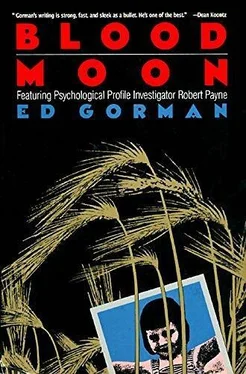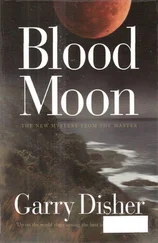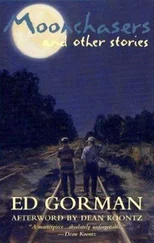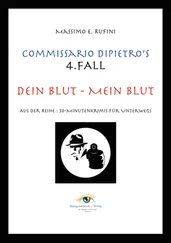“Craig Tolliver,” I said.
“Who?”
“Craig Tolliver.” The son that the rich man Tolliver had told me had “died,” but was still alive and somewhere in town.
“You never heard your husband mention him?”
“No.”
“June 23, 1958,” I said. “That’s the birth date given here.”
“I wonder why my husband had that birth certificate.”
I set the birth certificate down and opened up the flap of the white number-ten envelope.
Inside was a piece of letterhead from the First National Trust Bank — “Your Friend in Deed Since 1926” — that thanked Sam Lodge for renting a safe-deposit box. The letter went on to say that it was sure he’d find many of their other services to his liking, too.
“He ever mention a safe-deposit box to you?”
“Not this one. Where we do the rest of our banking, in Iowa City, we have a safe-deposit box there.”
“When can you get this opened?”
“I called my attorney. He said that if I take in proper ID, along with this letter, the bank will probably let me open it up tomorrow.”
“You going to do that?”
She nodded. “Maybe when I get it open, I’ll find out who killed him.” She smiled sadly. “Maybe by then I’ll be able to cry.”
“You mind if I keep this birth certificate?”
“That’s fine.”
We were silent for a moment. She looked around the room. The rain pounded and bounced on the roof.
“This room really does depress me,” she said.
I was the same way after my wife died, so I recognized the feeling, fleeing any room where my memories of her grew too painful. It could be any room at all, one I’d never even been in before. But when the memories overtook me, I had to get out.
She was up, at the door.
I walked over to her.
“Thanks for bringing these over.”
She looked up at me. “Maybe I’ll drive to Iowa City and go to a movie.”
She wanted my permission. “That sounds like a good idea. See something light.”
That was another thing I’d learned about mourning. Comedies can help you a lot.
She stepped forward and gave me a hug — not because I was me, but because I was another warm sensate human animal, and she very badly needed contact with a like creature. It was a sisterly hug, and I gave her a brotherly one right back.
After she left, taking her soft intelligent voice with her, there was just the thrumming sound of the rain.
The house where Tolliver was staying was three blocks east of my motel. The walk was good. My middle-aging body was in bad need of exercise. In the fresh, wet air you could smell the summer flowers struggling for birth in the damp, dark mud. You don’t know what rich black soil is till you’ve held Iowa soil.
Tolliver was staying in a stone Tudor that looked as if it might be more comfortable in Beverly Hills. Lights shone in the mullioned windows.
He answered the door on the second knock. He wore a denim work shirt and a pair of chinos. He looked like a rich man trying hard to look ordinary.
“You look kind of stressed out,” he said.
“I am.”
He stepped aside and let me walk through the vestibule and into the living room with its massive open fireplace and Edwardian antiques. G. K. Chesterton had probably sat in just such a room while he wrote his Father Brown stories.
“Some sherry?”
“No, thanks,” I said.
He pointed to a Morris sofa. “Why don’t you sit down?”
“I need to keep moving. But I wanted you to see this.”
I handed him the manila envelope. He opened it up and took out the birth certificate, which he carried over to a lamp with a baroque shade.
“Is it authentic?” I said.
“From what I can see of it here, yes.” He moved it around in the light under the shade. “Where did you get it?”
“Sam Lodge’s wife found it in their house.”
“Does she know how Lodge got it?”
“No. But that’s not too hard to figure out.”
“It isn’t?”
He brought the certificate back to me.
“Lodge found this somehow and then started blackmailing your son. Eve McNally told me that her husband suddenly came into a lot of money. Joanna Lodge said the same thing about Sam.”
“So they figured out who Craig is.”
“Yes, and Craig returned the favor by killing Lodge.” I didn’t mention that he’d also kidnapped McNally’s daughter.
He looked at me with great weariness and sorrow. “We’re getting close to him, aren’t we?”
“Very close.”
He grabbed the sleeve of my jacket. “We’ve got to stop him.”
“I know. And I plan to.”
He looked longingly at the birth certificate, the way a man would look at a baby picture of his son. “I’ve read a lot about genetics these past few years. I suppose he was always a monster — just born that way, you know? But I don’t want to absolve myself of the part I played in it. I should have stopped him a long time ago.” He made no effort to hide his tears. “He really is a monster, isn’t he?”
“I’m afraid he is.”
I glanced around the room. What a perfect night for a place such as this, and all the better if you had Jane Avery for company, make her some hot cocoa and put on one of the old Basil Rathbone Sherlock Holmes movies, foggy and mysterious London, but the fog and mystery of fiction, not the gore and grief of real murder.
“I’ll keep you posted,” I said.
The last thing he said was, “Do what you need to, Mr. Hokanson. Anything at all you need to.”
I nodded and went back out into the night.
In my room, I grabbed a box of ammunition, a flashlight and my small leather bag of burglary tools. I sensed it was going to be a long night.
In my car, I laid my Ruger on the passenger seat, put the ammunition neatly next to it, and backed out of the parking lot.
I needed to go back to the church. It was time to confront the good reverend and tell him everything I knew. Then it would be time to have him give Melissa McNally back to her mother.
Steam covered the windows. The defroster didn’t seem to help much. By the time I had rubbed the window clean, I was pulling up next to Jane Avery’s patrol car in the parking lot of her apartment complex.
She answered on the first knock. Whatever it was she really wanted to say, she restrained herself and said simply, “Oh.”
“I figured you’d be happy to see me.”
“I’ve got a headache, Robert, and I’m really not up for this.”
I sighed. “Look, I know you’re taking all this very personally, but you shouldn’t.”
“That’s what you drove out here to say?”
“I drove out here to say that I like you. A lot.”
“I wish you’d leave.”
“Goddammit—” I shook my head. “Sorry. I’m a little strung out at the moment.” I looked inside her decidedly untidy apartment. “You’re getting better. I don’t see any panties hanging on any doorknobs.”
She didn’t laugh. She didn’t even smile.
“Are you going to invite me in?”
“No.”
“Just like that? ‘No.’ You didn’t even have to think it over.”
“You’re obstructing justice, for one thing. You could be arrested.”
I reached out and touched her shoulder. At least she didn’t wince or pull away. “When it’s all over, you’ll understand why I couldn’t tell you anything.”
She turned her fetching head sideways, looking over her shoulder. “I’ve got some vegetable soup on. I’d better go eat it.”
“You make it yourself?”
“Right.”
“I forgot. That you’re a lousy cook, I mean.”
She looked at me a long time and said in a voice husky with pain, “Robert, just get out of here, will you? I really don’t appreciate this.”
Читать дальше









